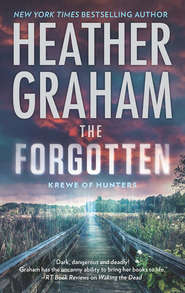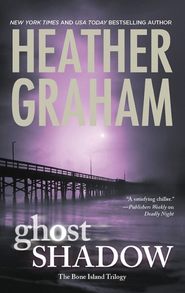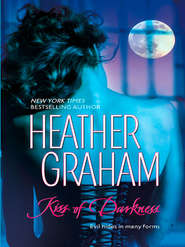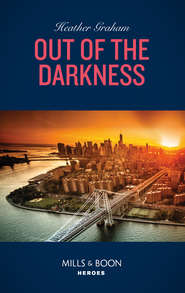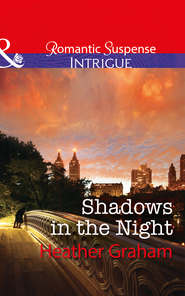По всем вопросам обращайтесь на: info@litportal.ru
(©) 2003-2024.
✖
The Unholy
Настройки чтения
Размер шрифта
Высота строк
Поля
“I believe that, Eddie. With my whole heart.”
“Thank you.”
He was quiet.
“I heard not to come in, Eddie,” Madison said. “Alfie called me.”
“Actually, Madison, I do want you to come in. I have a friend arriving—a film effects artist I worked with years ago. He’s a member of the FBI now, and he’s going to handle a special investigation for me. I’d like you to meet with him, show him around the studio.”
“I—I thought it was closed down, other than for the police?” FBI? How had he gotten the FBI involved? She wasn’t savvy about law enforcement, but she’d always assumed the FBI only came in for serial killers or kidnapping or crimes that spanned several states.
And how the hell did a special-effects artist wind up in the FBI?
And, oh, God, why had Eddie chosen her?
She knew exactly why Eddie had chosen her. He’d never challenged her, he’d never forced her into a corner over this. But he believed—had reason to believe—that she talked to the dead.
“The police closed the Black Box Cinema. But I closed the studio. And Sean—Sean Cameron—won’t be here until this afternoon. I just talked to him in the wee hours of the morning and he’s coming from Virginia. I’m picking him up myself, so I’ll swing by for you after I’ve collected him from LAX. If that’s all right with you.”
Madison exhaled on a long breath. The man she had hero-worshipped for his artistry throughout her formative years was asking for her help. The same man who’d hired her and opened up a world that she’d only dreamed of knowing.
“Eddie, I would do anything for you,” she assured him humbly. “And for Alistair.”
“Thank you. I think you’re the right person to work with Sean. And I deeply appreciate your friendship—for Alistair and me. You can expect me around five.”
“Of course,” she murmured lamely.
Eddie wasn’t ready to hang up. “Alistair didn’t do it—he really didn’t.” He was quiet for a minute. “He told me that the Egyptian priest, Amun Mopat, came down from the Sam Stone tableau, and killed her. Alistair tried to reach Jenny, but slipped in the blood, conked himself out…and then came to and saw it was real—he was lying in a pool of blood. I guess it’s normal for the police to think that either he’s crazy or his story is and that he’s going to try for an insanity plea. But I know my son. I know he didn’t do it. And only someone who’s familiar with the studio can prove he didn’t.”
“We’re in Hollywood—a place filled with actors and effects,” Madison said.
“Yeah,” Eddie agreed, sounding bitter. “But, oddly enough, I believe we’re the only ones who see the possibility that Alistair didn’t do it. Anyway, Madison, I’ll be by for you. If you’re sure you don’t mind.”
“I’m happy to show your guy around the museum, Eddie.”
Eddie Archer ended the call. Madison sank down into her art deco–style sofa, setting her phone on the coffee table in front of it.
“Hey.”
Madison nearly leaped a mile into the air at the sound of the voice. Her hand fluttered to her throat; her heart thudded.
She turned and saw the man who’d spoken, standing just behind her.
The voice was soft. The man was slight, with dark graying hair and a wonderful face filled with character.
She let out a breath. Her sometime-resident “invisible” friend—whether extension of her imagination or real ghost—was seated on the arm of the sofa, looking at her sorrowfully.
“You all right, kid?”
She let out a breath, realizing that the very concept of someone being murdered where she worked was terrifying.
“Yeah. It would help if you didn’t startle me like that.”
“I spoke quietly. And I’m not exactly a surprise now, Madison, am I?”
No, not anymore.
She could see him plain as day, as if he were flesh and blood, a good friend who’d stopped by in a time of need. He had a fascinating, ruggedly masculine face—including his slightly scarred lip—and a lean, slight form. When he stood, he was on the short side at only five feet eight inches.
“Um, I’m fine. I’m just stunned,” Madison said. Then she rushed into words, well aware of how ridiculous she’d look if anyone else was there—because she saw Humphrey Bogart as he sat in her living room. “I don’t know how much you hear or fathom from phone conversations, but there was a murder at the studio last night. A starlet who was with Alistair Archer. I can’t believe he killed her. I won’t believe it—not Alistair. Eddie must be beside himself, desperate to help him. He’s such a loving father.”
“Watching a child suffer is a hard thing,” Bogie said, his voice low and slightly nasal.
Bogie.
Madison stared at him. Was he an imaginary friend? She would never be sure. She’d had strange experiences as a child. She’d tried chalking them up to growing pains, teenage angst and, as her parents had suggested, an overactive imagination—the kind that had led her right into a career. She’d also had experiences that had broken her heart—and might be part of the reason she embraced her work, day in and day out.
Bogie hadn’t come with the bungalow, though he’d lived there briefly in the 1920s. He’d told her once that he had loved it and loved living there. She’d first met him at the wax museum when she was a college student; she’d assumed he was a look-alike actor hired to play the part. They’d spoken and laughed together….
And he’d followed her home.
Bogie showed up whenever he wanted to. Apparently he had other places to haunt, as well. Madison simply accepted him as a friend—imaginary though he might be. Sometimes she thought she was crazy; sometimes she thought she was incredibly lucky that such a man had chosen her to haunt. Although she believed that now, she hadn’t always. He’d scared her to death at first, and had occasionally made her life hell.
He’d just startled her today; the first night she’d seen him sitting on her sofa, however, he’d practically given her a heart attack. She’d fumbled to call the police, and they’d come and almost arrested her, assuming she was another college kid trying to make trouble. Bogie had been apologetic and courteous—so sorry for causing her distress. He was what he was, and he’d tried to explain, but she hadn’t believed him.
Maybe he was imaginary, but she didn’t know what part of her mind triggered his appearances.
And if he was, what about the other dead people who’d spoken to her?
But imaginary or not, he was there for her now.
“Have some coffee, kid. That’ll make you feel better.”
“I’m not sure it will help me feel better. But at least it’ll wake me up.”
“What are you waking up for? You could go back to sleep.”
“Why is it that everyone thinks I can sleep now?” she muttered.
Bogie ignored that, standing and stretching as he gazed out the windows. He turned to look at her. “The murder took place in the studio?” he asked.
She shook her head. “The underground tunnel between the Black Box Cinema and the studio—where Archer has his film noir museum.”
“Interesting,” Bogie mused. “By which display?”
Madison frowned. “The news didn’t say, but Alfie told me it was by the tableau for Sam Stone and the Curious Case of the Egyptian Museum. Sounds crazy, doesn’t it? I mean, especially since the studio is now in lockdown because of The Unholy—the Sam Stone remake.”
“A lot has been crazy in Hollywood through the years. You’ve heard about the case of the Black Dahlia? Poor girl, tortured and then displayed, chopped right in two,” Bogie said, shaking his head. “There’s always been murder out here—and out here, it becomes sensational, with more emphasis on the drama than the tragedy. You had Fatty Arbuckle and the murder of Virginia Rappe back in 1921, and later, you had the Manson murders and then the Simpson murders, and anytime anyone’s killed here, the press is out looking for every sordid detail.” He shrugged. “I watch the news, you know,” he told her seriously, “as well as old comedy reruns. And, kid, this is a big place full of illusion. Murder isn’t confined to Tinseltown, but there’s no way it’s not going to occur here, too.”







